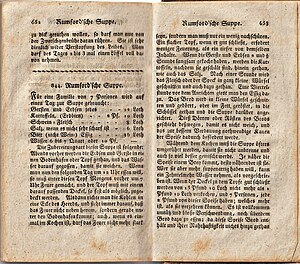Rumford soup
Rumford soup or Rumford soup is an inexpensive nutritious soup made from pearl barley and dried peas . Benjamin Thompson , Imperial Count von Rumford, invented it in 1795 for the soldiers of the army of his employer, the Bavarian Elector Karl Theodor von der Pfalz , and for the beggars and unemployed arrested in his military workhouse in the Munich Au , in order to keep them economical but still nourishing to supply. It was subsequently distributed to the needy in numerous soup kitchens .
preparation
The simplest Rumford soup consists only of pearl barley and peas , which are boiled in water for hours until a creamy, thick soup is created. It is seasoned with salt and beer vinegar . This soup could be made in the workhouse in the Munich Au for three pfennigs per serving.
According to Rumford, pearl barley was the best basis for such a soup. He wrote:
“All the other European types of grain and pod fruits, with which I tried, always had only half the effect, and at one cost only gave half the nutritional value. Barley can therefore be seen as the rice of Great Britain! It certainly requires a long and strong boil; but when this is done properly it thickens a great deal of water and, I suspect, prepares it for decomposition. So it gives a soup, of which it is a component, a wealth of nourishing substance which nothing else is able to give. "
In order to save further costs, part of the barley was then replaced by potatoes , which reduced the costs by about one more penny per serving. Rumford also recommended adding stale white bread, thinly sliced and left over in bakeries , to the soup plate because it has to be chewed: “As is well known, chewing promotes digestion very strongly; it also extends the length of time you can enjoy eating, ”Rumford noted.
On the other hand, Rumford and later cookbook authors also recommended richer recipes, supplemented with vegetables such as onions , carrots , celeriac , turnips , leeks , kohlrabi , white cabbage or sauerkraut . The water is replaced by bone broth enriched with some meat such as fresh or cured pork or beef , bacon or offal . Depending on the recipe, this richer soup is seasoned with spices and herbs such as pepper , marjoram or thyme , but vinegar is usually not used. The bread is toasted in fat in slices or cubes. Such variants also found their way into the middle-class kitchen of the 19th century.
history
During the coalition wars against Napoleon's troops, the urban population became impoverished and in many places they had to rely on soup kitchens , where Rumford soup was often served.
At the turn of the year 1803/1804 this soup was also introduced in Prussian Silesia . The " Schlesische Provinzialblätter " reported on the free edition in Grünberg on February 18, 1804:
“Our city is enjoying one more charitable event now. In order to come to the aid of the poor in our city, the Rumford power soups have been introduced here too according to the usual ingredients, and those with this soup since December 27th. Samples made in 1803 turned out to be such that they confirmed the good they praised. Police director Höpfner has the soup prepared twice a week with various alternations for 40 people and distributed to the poor free of charge until the soup is averaged out thereafter or voluntary gifts are made by charitable people. "
In 1816 , the notorious year without a summer , Rumford soup was given in Bavaria to alleviate the famine.
Merck's product encyclopedia from 1920 knows a “so-called“ soup food ”(which are defined as“ mixtures of meat with flour, vegetables and fat ”) under the heading“ soup durations ”. Rumford soup ”, before boiling in water, consisting of 44.7% flour, 31.8% pearl barley, 13.5% coarse pieces of meat and 10.0% table salt.
Reviews
Rumford soup has been reviewed again and again since its invention :
- Karl Marx , who in 1867 wrote the first edition of his work Das Kapital about Rumford's recipe also of corn and herring as ingredients, described Rumford soup as “counterfeit goods” - and found only unflattering words for the soup inventor: “[…] an American humbug ".
- Heinrich Heine was also familiar with the soup, but before consuming it, he had to consider: "All traditional cheerfulness, all sweetness, all floral scents, all poetry will be pumped out of life, and nothing will be left of it but Rumford's soup of usefulness."
Similar dishes
literature
- Benjamin Thompson Graf von Rumford: Small writings of political, economic and philosophical content ; “About eating and feeding the poor”, p. 254ff. Weimar 1797 ( Google Books )
- Katharina Prato: The South German cuisine . Graz, 1881.
- Sophie Wilhelmine Scheibler: General cookbook for all stands . Leipzig 1884.
- Charlotte Löfflerin: The latest cookbook for households of all levels . Reutlingen, undated, around 1900
- Swabian cooking recipes for preparing simple, traditional food . Stuttgart 1909.
- Erhard Gorys : The new kitchen dictionary . From Aachener Printen to intermediate ribs . 13th edition, dtv, Munich 2011, ISBN 978-3-423-36245-0 .
- Johann Georg Krünitz, Oekonomische encyklopädie , Volume 157, pp. 140f, digitized recipe from 1833.
- Karljosef Kreter : The poor , in Michael Stöber , Lower Saxony Institute for Historical Regional Research eV (Red.): Poor foundations in the course of the centuries. 750 years of tradition and responsibility in Hanover , documentation of an exhibition, ed. from Stift zum Heiligen Geist, St. Nikolai Stift zu Hannover, Senior-Bödeker-Stift, Johann-Jobst Wagener'sche Foundation, State Capital Hannover: Department of Library and School - Department of Foundations; City Archives Hanover, Hanover: Lower Saxony Institute for Historical Regional Research, 2008, p. 11f.
- Carl Arnold Kortum : About the preparation of Rumford soup (1802) , in Hans H. Hanke: Reading book Carl Arnold Kortum. Cologne 2013, pp. 108–116
Web links
Individual evidence
- ↑ a b Quotations from Karljosef Kreter: Das Armenwesen (see literature)


